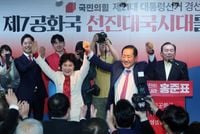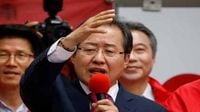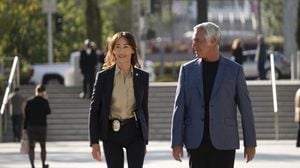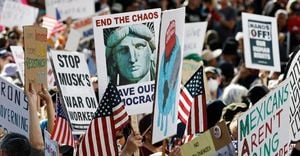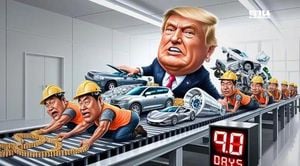SEOUL, April 15 (Yonhap) -- Hong Joon-pyo, the former mayor of Daegu, formally announced his candidacy for the presidency this week, setting the stage for a competitive race as South Korea prepares for its upcoming presidential election on June 3, 2025. With the political landscape shifting following the impeachment of former President Yoon Suk Yeol, Hong, affiliated with the conservative People Power Party, is advocating for sweeping political reforms and a return to traditional governance by relocating the presidential office back to Cheong Wa Dae.
Speaking at his campaign office in Seoul on April 15, Hong outlined his vision for South Korea, emphasizing a commitment to constitutional reform. "I will start the constitutional reform immediately after I take office by launching a presidential task force for the reform," he stated, underscoring his intention to reshape the political system. His proposal includes reversing Yoon's controversial decision to move the presidential office to the defense ministry compound in Yongsan, a move he believes undermines the historical significance of Cheong Wa Dae.
Hong's announcement comes on the heels of Yoon's impeachment, which was upheld by the Constitutional Court on April 4, following a martial law declaration in December. This political turmoil has created an environment ripe for change, and Hong is keen to capitalize on it. He criticized the Constitutional Court for what he described as a loss of political neutrality, pledging to abolish the court and transfer its functions to a new division within the Supreme Court.
In his campaign, Hong paints the upcoming election as a pivotal choice between his administration and that of Lee Jae-myung, the leader of the Democratic Party. He characterized the election as not merely a matter of regime change but as a decisive moment for the future direction of the country. "It is a choice between the Hong Joon-pyo regime and the Lee Jae-myung regime," he asserted. He further warned against populism, likening it to the economic struggles faced by countries like Venezuela.
Hong's vision for a "7th Republic" includes significant reforms aimed at enhancing political accountability and representation. He proposed introducing a two-house legislative system to dilute the regional monopoly of certain political parties and suggested that the current constitution has stifled economic creativity and freedom. "We will create a country that gives freedom to companies and the rich, opportunities to the common people, and dreams to young people," he promised.
On the international front, Hong addressed the ongoing tensions with North Korea, asserting that nuclear weapons are necessary for deterrence. "North Korea can only be prevented by nuclear weapons," he declared, emphasizing the need for South Korea to maintain a credible defense posture while engaging in diplomatic negotiations with the United States.
In a nod to the current economic climate, Hong also discussed the importance of fiscal responsibility, stating, "We need a national consensus on the total amount of debt and welfare," and called for careful consideration of repayment plans in relation to growth rates. He pledged to ensure that college admissions would be based on fair evaluations, centered around the College Scholastic Ability Test, and proposed a preliminary bar examination system for aspiring judges and prosecutors.
As part of his broader campaign strategy, Hong has vowed to take decisive action against crime, including a controversial promise to execute felons sentenced to death within six months of taking office. This commitment has sparked debate, reflecting the polarized views on capital punishment in South Korea.
The launch of Hong's campaign, termed the "Sudae Hong Camp," was met with enthusiasm, drawing over 2,000 supporters, including 17 incumbent lawmakers. The event showcased a diverse coalition rallying behind Hong, with attendees expressing their belief in his ability to lead the country toward a brighter future. Rep. Yoo Sang-beom, who spoke at the event, emphasized the trust in Hong's leadership, stating, "I decided to join Hong because I believe that I can win the presidential election."
As the election date approaches, Hong's campaign is gaining momentum, positioning him as a formidable contender in a politically charged environment. His proposals for reform and a return to traditional governance resonate with a segment of the electorate seeking stability and change in the aftermath of recent political upheaval. With the People Power Party's primary on the horizon, Hong's vision for South Korea will be tested as he seeks to secure his place as a leading candidate for the presidency.
As South Koreans prepare to head to the polls in June, the stakes are high. The outcome of this election could redefine the nation's political landscape and set the course for its future. With Hong Joon-pyo at the forefront, the call for reform and a return to foundational governance is echoing throughout the country, inviting a broader conversation about what South Koreans want from their leadership in the years to come.
